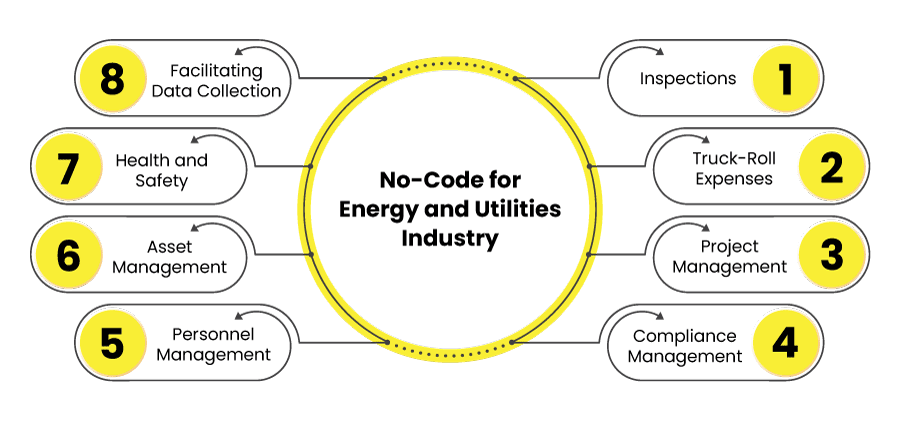
We explore how no-code interventions can truly energize the processes of the Energy and Utilities industry through project management and data tools.
Due to the COVID-19 pandemic, the energy industry witnessed a drastic change in consumption patterns and a surplus in supply. This made matters worse for an industry that was already struggling with socially distant staff and other such circumstances. A lot of these issues stemmed from the fact that the industry has been infamous for being a digital laggard and therefore, lacked the required digital tools and infrastructure that are required to deal with such contingencies. Having said that, it’s not too late! Adopting the best digital tools and practices can push the energy and utilities towards a future of digital transformation.
Digital tools like AI and no-code can lead to the prevention of unplanned power outages, cut operational costs, and increase customer satisfaction greatly. The adoption of digital tools is more of a requisite than a choice, as it is estimated that databases might not be able to extract value from 21st-century data streams and might collapse.
Also read: The Impact of Digital Transformation on Business Performance
The change is evident already. And the device leading this change is none other than our mobile phones! Mobile apps are becoming more and more popular and prevalent in the energy and utilities industry. Digital-forward energy organizations have been using mobile apps to carry out a large number of crucial tasks which include field inspections, equipment tracking, reducing truck roll-outs, etc. This sort of application development is where no-code tools are a complete blessing. Without writing a single line of code, you can create just the right application that supports your organization and staff in an unmatched way. Let’s dig deeper into how no-code is paving the future for the No-Code in energy and utilities industry:
No-Code for Energy and Utilities Industry

1. Energy and Utilities Inspections
The energy and utilities industry has a plethora of various types of inspections that need to be carried out on a frequent basis. From utility pole inspections to energy audit inspections, a lot needs to be done on this frontier. The use of outdated spreadsheets and paperwork just makes it worse. With no-code interventions, you have the power to streamline and modernize inspection processes greatly. Images, GPS, checklists, and other such features allow you to run your operations smoothly while cutting down on costs, increasing efficiency, and enhancing stakeholder satisfaction.
2. Lowering Truck-Roll Expenses
Truck roll expenses are the costs that are incurred while sending out a truck into the field. They vary greatly from company to company and it can be very difficult to estimate them accurately. These expenses usually take away from a company’s profit as a lot is spent on maintaining the fleet and paying for associated costs like fuel and insurance. What’s more, they also bring down the speed of operations as the process includes a lot of hassles.
To prevent truck-roll expenses, companies are finding innovative solutions like RFID-enabled platforms that help bring down transit times, leading to higher profitability and streamlining workflows. A leading engineering company, built and deployed an RFID-based truck management system using no-code.
Also Read: Digital Transformation in Utilities
3. Energy and Utilities Project Management
Organizations in the energy and utilities industry are on the constant lookout for ways to increase their efficiency when it comes to operations and produce precise monthly reports. There is a crucial need for software that can forecast accurately, integrate operational systems, back-office systems, and supply chain management, and even control costs.
With no-code tools, you can manage your projects effectively and efficiently by automating different project activities through workflows. You can also get the real-time status of project tasks based on data entered by the field staff from anywhere using any device.
4. Compliance Management
Compliance management is an important aspect of project management for companies in energy and utilities industry. With increasing awareness about the risks involved in the energy sector, the sector’s compliance mandates have become regulated and standardized. Within such scrutiny, companies need to ensure that compliance does not come in their way of carrying out day-to-day operations.
Worry not, no-code has solutions for that too. You can easily build and maintain checklists to capture compliance data using any device from anywhere and access it in real-time from the central server.

5. Improving Personnel Management
Companies in the energy and utilities industry employ a large number of people that are present across various geographies and sites, making it tough for Human Resources and top management to reach out to all of them and communicate effectively. This issue has further aggravated due to the pandemic, as remote work has made everyone scattered even more than before.
No-code changes the traditional way of the paper filing system. Through its tools, you can create customized timesheet forms, incident reports, and allow immediate updates through e-mails and messages. You can now empower your in-house and field staff to collaborate on a unified platform using automated processes and workflows that create accountability at each process step while providing visibility into overall operations.
6. Asset Management and Maintenance
Shipment delays are the most common issues that lead to delays in utility projects. In the case of replacement of a circuit or power line, team members should have the ability to be able to quickly send in a ticket and receive a quick response. By creating an online asset repository, you can manage the maintenance of equipment through pre-configured preventive maintenance schedules with inbuilt reminders and notifications. This leads to the minimization of emergency repairs and reduces operational costs.
It’s time to move over the old paper and spreadsheet systems. Using no-code tools, create platforms that deliver request orders and track updates, and are flexible enough to keep the operations running in case of any unforeseen incident. Such features increase the quality of field operations immensely as well. You can improve collaboration among project teams, vendors, and clients, over automated processes and workflows. Accurate resource management also leads to savings of time and cost.
7. Health and Safety
By actively using EHS (Environmental, Health and Safety) checklist apps, you can reduce the chances of any accidents that might bring operations to a halt or lead to unnecessary delays. Incident reporting apps created through no-code tools let stakeholders report any issue while capturing GPS location along with video or images. Using this feature, reporting authorities can also estimate the need of the hour accurately instead of relying on just verbal intimidation. This increases the speed of incident resolution by connecting the right people at the right time and fast-tracking all that needs to be done.
8. Facilitating Data Collection
The collection of precise and useful customer information while in the field is a daunting challenge faced by most energy companies.
Earlier, there was a major dependence on field service technicians and salespersons for this purpose. They used to take forms around on their clipboards to gather data from the customers. No points for guessing, this method was very disorganized and did not lead to the desired results. The data in question would often be inaccurate or not relevant. Further, manual filing of this data would consume more time and would lead to greater errors.
Thank god for digital interventions! Data collection systems eliminated the need for paperwork and other such ineffective processes. Without writing a single line of code, no-code tools allow you to create the perfect systems that empower you with just the data you need, minus any errors and inaccuracies. Such solutions not only gather useful data, but also help you to track customer payments, accounting, and sales commissions.
Another important benefit of digital data collection is speed. In the world of paper forms, information sharing is slow. One individual fills the form, then it goes for approvals after which it is posted/sent for signatures, etc. This is immensely time-consuming and leads to delays in important decisions, which simply cannot be afforded in the energy and utilities sector. Mobile forms enable real-time information sharing because they can be sent through the Internet in a matter of seconds. This leads to quick decision making and greater benefits for your organization.
Explore: How Quixy ensured sunshine at Sunworks with 20% improvement in sales conversion
Choosing the right no-code tool for the Energy and Utilities sector
It is a no-brainer that every company involved in the energy and utilities sector should be adopting the digital practices listed above in order to make their organization reach unmatched heights. The no-code approach not only saves your company a ton of money, but it also enables you to develop apps within a matter of a few hours or days, a process that used to take months at end.
However, as much as no-code is beneficial to your company, it is equally important to focus on the platform you choose. Not all platforms are created equal. It is important to choose a platform that gives you the right amount of flexibility, support, and customization. An added benefit would be if the platform you are choosing has already been used in the given sector, as that acts as a testament to the usefulness of that particular platform for the relevant processes.
Quixy is a leading no-code platform that is a favorite among the top companies in the energy and utilities sector. Get started with our platform, and experience the ease of automated processes and personalized app building.
Transforming your future is just one decision away.
Conclusion
The adoption of digital practices, particularly the no-code approach, is a clear imperative for companies in the energy and utilities sector. Embracing these strategies is not only a cost-effective choice, but it also revolutionizes the pace of app development. What once required months can now be accomplished within a matter of hours or days. This transformative shift not only saves resources but also propels organizations to unparalleled heights of efficiency and innovation. It’s a game-changer that empowers companies to thrive in an increasingly competitive and fast-evolving landscape, making the future of energy and utilities brighter.
Frequently Asked Questions ( FQA’s )
1. How are no-code and low-code platforms different for energy applications?
No-code platforms are fully visual and designed for non-technical users, while low-code platforms require some coding knowledge. Both simplify app creation but cater to different skill levels in energy operations
2. Why should energy companies adopt no-code tools?
No-code tools accelerate digital transformation by making it easy to create customized solutions, improving collaboration, and reducing operational bottlenecks. They empower teams to innovate without heavy reliance on IT.
3. How can no-code tools improve asset management for utilities?
No-code platforms enable real-time tracking of equipment, automate maintenance schedules, and simplify data collection. These features improve asset performance and reduce downtime.
4. How do no-code platforms help cut costs for utility companies?
No-code platforms lower costs by eliminating the need for extensive IT resources, enabling faster app development, and reducing dependency on external vendors. This allows utility companies to allocate budgets more efficiently.
5. What kinds of applications can no-code tools create for energy companies?
Energy companies can use no-code platforms to develop apps for workflow automation, customer service portals, and predictive maintenance systems. These apps enhance productivity and operational transparency.
6. What are practical uses of no-code tools in the energy and utilities sector?
No-code tools are used to build energy monitoring dashboards, automate billing processes, and streamline compliance tracking without needing technical expertise. These solutions boost efficiency and reduce the time spent on manual tasks.
Login
Please login to comment
0 Comments
Oldest















